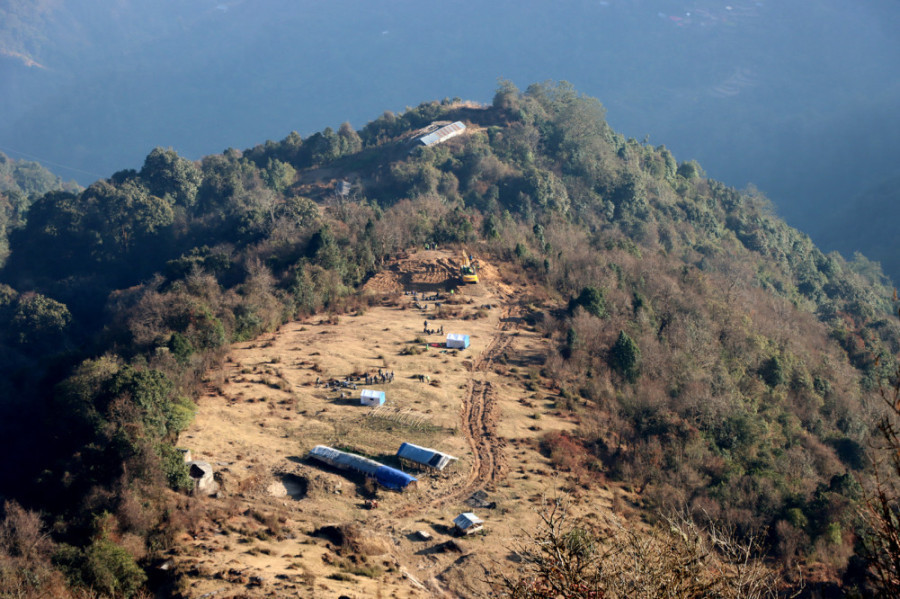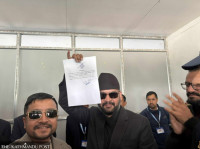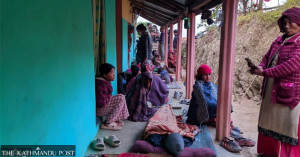Koshi Province
Pathibhara cable car protests to resume
To stop construction at the holy site, agitating groups threaten to internationalise the issue.
Post Report
The ‘No Cable Car’ to Pathibhara Temple group has decided to internationalise the issue, accusing the government of ignoring their grievances. At a press conference in Lalitpur on Tuesday, the group said it had decided to internationalise the issue, and take it to the international court if necessary.
The indigenous community, especially the Limbus, considers that the Pathibhara Temple in Taplejung falls under the Mukkumlung area— a sacred religious site. Indigenous groups have been agitated after the Global IME Group started to construct the cable car up to the Pathibhara temple.
“Despite repeated negotiations with the government and an agreement to resolve our issue through high-level talks, the government's lack of due attention has compelled us to move forward with the intention of internationalising our demands,” said Saru Singak, who led the No Cable Car group during negotiations with the government in February.
The government side was represented by Prem Prasad Bhattarai, joint-secretary at the Ministry of Home Affairs.
Similarly, the statement issued after Tuesday’s press conference also said: Steps will be taken, including informing the UN and other international bodies, on issues related to Mukkumlung.
A 2.7 km cable car is being constructed from Kaflepati in ward 10 of Phungling, Taplejung to the temple. The agitating groups and individuals have been demanding that Pathibhara (Mukkumlung) should be preserved in its original state, as it is a sacred heritage of the Limbu community.
The Mukkumlung Struggle Committee, the Cable Car Cancellation Joint Struggle Committee, the Kirat Yakthung Chumlung, and some political forces advocating identity politics including the Rastriya Janamukti Party and the Loktantrik Rastriya Manch have been protesting against the cable car project.
In early February, when a dispute arose—regarding the construction of the cable car—between the No Cable Car group and the government, the protesting side enforced a transport shutdown across nine districts in the eastern region. In its wake, two days of dialogue with the government led to a six-point agreement on February 4.
Although the agreement stated that the issue would be resolved through follow-up dialogue with a high-level political team, no initiative was taken at the political level.
Again a violent clash was reported between the ‘No Cable Car’ group and security personnel in the Pathibhara area of Taplejung district on February 20. At least 13 people, a protester, a taxi driver and 11 security personnel sustained injuries.
The clash broke out when protesters opposing the Pathibhara cable car project attempted to march towards the construction site. In response, the Nepal Police and the Armed Police Force (APF) personnel intervened, leading to the confrontation.
The security forces fired teargas at the protesters to bring the situation under control.
Meanwhile, on March 16, the Mukkumling Tangsel Chumbo and Mukkumlung Conservation Inter-Party Struggle Committee held talks and discussion with the political parties’ facilitation team. During that meeting, it was agreed that high-level talks would be held on March 19.
While the Mukkumling Tangsel Chumbo team announced their dialogue team, the government side failed to do the same, leading the planned talks to collapse.
However, asked why the No Cable Car movement, relatively inactive for about two months, was being revived, Singak explained that on April 14 the Supreme Court issued a verdict on one of the three writ petitions filed nearly seven years ago by Kanchenjunga Conservation Area Management Council.
In its decision, she added, the Supreme Court issued an interim order to maintain the status quo on all matters related to cable car construction until further notice. However, when the group in favour of the cable car began misinterpreting the message that the court had cleared the way for construction, and planned to resume the project, they were forced to announce a fresh round of protest.
While the No Cable Car group plans to internationalise the issue, the government maintains that the Bhattarai-led team is already there to carry forward the negotiations.
However, the No Cable Car group maintains that their concerns cannot be addressed at the bureaucratic level, and insists on holding talks with a ministerial-level team, arguing that only the political leadership can address the dispute.




 10.12°C Kathmandu
10.12°C Kathmandu












